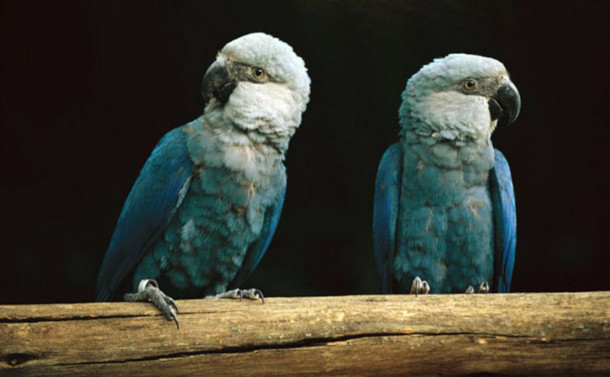BirdNote®: Return of the Extinct Little Blue Macaw
Air Date: Week of November 3, 2023

Two blue Spix’s Macaws perch on a tree branch. (Photo: Etna 1984)
With a little help, some species can make a miraculous comeback, even from extinction in the wild. BirdNote’s Lucina Melesio has this story about a recent avian recovery.
Transcript
DOERING: With a little help, some species can make a miraculous comeback, even from extinction in the wild.
BirdNote’s Lucina Melesio has this story about a recent avian recovery.
BirdNote®
The Return of the Extinct Little Blue Macaw
[Spix's Macaw call]
Even if the name Spix's Macaw doesn’t ring a bell, you might recognize this bird. It’s Blu, from Rio, the animated film!
[Short clip from Rio trailer]
NARRATOR IN TRAILER: He’s about to discover how rare he really is.
VET: Blu is the last male of his kind.
BLU: I have a kind?
Also known as the Little Blue Macaw, they’re medium-sized birds with a gray head, intense blue plumage, and a black and robust beak. But the most characteristic feature of these macaws is their voice: a short and raspy "kraaaa!"
However, by the late 2000s, the bird’s voice… went silent.
[Fade out bird calls abruptly]
They were considered extinct in the wild. Since the 19th century, Spix’s Macaws have been hunted for the pet trade. They lost much of their habitat, the Caatinga, a semi-arid region in northeastern Brazil. To make matters worse, an introduced bee species competed with them for nesting sites.
[Spix macaw habitat soundscape]
A group of Brazilian and German conservationists saved a few individuals. They began a captive breeding program with just seven birds.
But after 20 years of breeding…. Success! Biologists raised the captive population to nearly 200 macaws! They had to be trained to fly, find food, and recognize predators in the wild.
[Spix's Macaw calls]
In 2022, the Spix's Macaw Release Project set free 52 individuals into their ecosystem in Brazil. Their distinctive voice rang out again in the caatinga.
###
Written by Paula Vilella
Senior Producer: John Kessler
Producer: Mark Bramhill
Managing Editor: Jazzi Johnson
Managing Producer: Conor Gearin
Content Director: Jonese Franklin
Bird sounds provided by The Macaulay Library of Natural Sounds at the Cornell Lab of Ornithology, Ithaca, New York. Spix’s Macaw ML57774 recorded by Bret Whitney.
BirdNote’s theme was composed and played by Nancy Rumbel and John Kessler.
© 2023 BirdNote October 2023
Narrator: Lucina Melesio
ID# SPMA-01-2023-10-17 SPMA-01
https://www.birdnote.org/listen/shows/return-extinct-little-blue-macaw
DORING: For pictures, fly on over to the Living on Earth website, loe.org.
Links
Living on Earth wants to hear from you!
Living on Earth
62 Calef Highway, Suite 212
Lee, NH 03861
Telephone: 617-287-4121
E-mail: comments@loe.org
Newsletter [Click here]
Donate to Living on Earth!
Living on Earth is an independent media program and relies entirely on contributions from listeners and institutions supporting public service. Please donate now to preserve an independent environmental voice.
NewsletterLiving on Earth offers a weekly delivery of the show's rundown to your mailbox. Sign up for our newsletter today!
 Sailors For The Sea: Be the change you want to sea.
Sailors For The Sea: Be the change you want to sea.
 The Grantham Foundation for the Protection of the Environment: Committed to protecting and improving the health of the global environment.
The Grantham Foundation for the Protection of the Environment: Committed to protecting and improving the health of the global environment.
 Contribute to Living on Earth and receive, as our gift to you, an archival print of one of Mark Seth Lender's extraordinary wildlife photographs. Follow the link to see Mark's current collection of photographs.
Contribute to Living on Earth and receive, as our gift to you, an archival print of one of Mark Seth Lender's extraordinary wildlife photographs. Follow the link to see Mark's current collection of photographs.
 Buy a signed copy of Mark Seth Lender's book Smeagull the Seagull & support Living on Earth
Buy a signed copy of Mark Seth Lender's book Smeagull the Seagull & support Living on Earth

